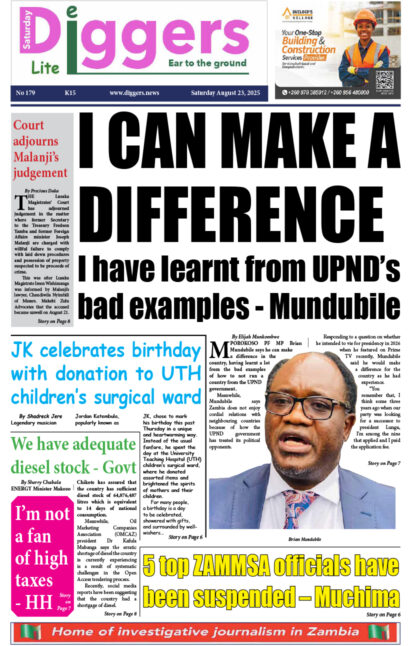The Centre for Trade Policy and Development (CTPD) has asked the International Monetary Fund (IMF) to give a clear position about its negotiations with Zambia for a bailout package to enable the country move forward.
And CTPD has predicted that the country will face a lot of challenges when time to repay all its loans finally comes because there is clearly no reasonable investment where all the acquired loans have been committed to.
Speaking on Hot FM’s Hot Seat programme where he featured alongside Zambia Tax Platform coordinator Ibrahim Kamara, Thursday, CTPD executive director Isaac Mwaipopo said the IMF’s failure to give its position on the bailout package that Zambia had been seeking from the Fund for years had stranded the country.
In July, the IMF revealed that talks on Zambia’s economic bailout package, widely expected to be around US $1.3 billion, have been suspended owing to concerns surrounding the country’s debt sustainability.
The Fund, through its communications director Gerry Rice disclosed that it had suspended discussions on a possible economic bailout programme because the Zambian government’s borrowing plans had compromised the country’s debt sustainability, which in-turn, will undermine Zambia’s macroeconomic stability.
“Zambia still needs the bailout package. And as the International Monetary Fund will be visiting this country; it is our hope from the Centre for Trade Policy and Development that the International Monetary Fund would be able to give a clear picture in terms of where we are going with these negotiations. The negotiations have been going on for quite a long time and they are actually affecting the ability for this country to move forward. So, it will be good if they can give a clear indication with regards to their position on the bailout package that Zambia has been seeking. On the question whether we need it (the IMF package), yes, Zambia needs the IMF bailout package. It can help to improve the balance of payments,” Mwaipopo said.
And he said Zambia will face a lot of challenges when time to repay its loans comes because there has not been any reasonable investment from all the loans.
“One of the challenges we are faced with is that there was a huge delay in setting up a Sinking Fund. There was a proposed plan to set up a Sinking Fund that was going to ensure that we put aside some resources to prepare for the time when we need to pay back the loans. As of this year, we’ve heard that there is some movement to put aside some resources to prepare for that, but the other thing is that there is a growing conversation around the need to look out to countries like China as well as other people that we owe some money to begin conversations around possibly restructuring the debt that we owe. So, if this conversation is gaining momentum, it also gives you an indication that we are foreseeing ourselves having a challenge to pay back some of the debt that we owe when they are due. So, one of the things we are trying to do is to buy-off some time, reorganise and rearrange the period under which this debt is to be paid or find an alternative route to manage that,” said Mwaipopo.
“But as for whether or not we will manage to pay back, that is yet to be determined, but at the rate at which we are moving, we think we might have a challenge to pay. Not necessarily defaulting, but there are several options, which you can pursue, one of them is restructuring the debt. Defaulting is something we need to avoid at all costs. However, debt is something to worry about really. Debt in itself is not bad, but it is something that you are in the position to pay back. I think the big question that we should be asking ourselves is: are we in a position to pay back when this debt matures or are we in a position to clearly point in terms of where we have invested the resources that we had acquired? If we are in the position, well and good, if we are not in the position, then it would call for concern and worry.”
Meanwhile, Kamara said much as Zambia needed the IMF package, the country could realise a lot of revenue if it invested in value-addition industries.
“In as much as we might need the bailout package, I also believe that the nation has so much potential to generate revenue from different sectors. The mine is one such sector, which can generate massive revenues into the government, diversification into the agricultural sector, and I think on the other thing we’ve lagged on is the industrial base in the nation. I think with regards to that, even the copper that the nation is producing, it’s exported in its raw form. But you can imagine if there was so much value added to copper, if there were industries, which were able to add value to certain things before we export them, those would become industries, which can be taxed and revenues can increased for the nation. So, I believe the nation has potential, but right now, we might be heading to a situation where we do in fact need the IMF bailout package, looking at the current debt stock for the nation,” said Kamara.
























